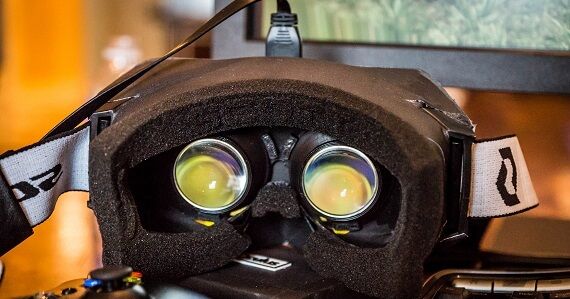The Oculus Rift virtual reality headset may not have a release date or price just yet, but it does have the world's attention.
Debuted last year during E3 2012, the head-mounted hardware projects stereoscopic 3D gaming images across a field of vision stretching 110 degrees vertically and 90 degrees horizontally. Full motion support -- replicating the turning and tilting of the head -- follows.
Games and their platforms require special programming before they can be used the device, but with manufacturer Oculus VR churning out prototype developers kits since August of 2012, corresponding with a fundraising effort on Kickstarter, it was only a matter of time before a pair became synchronized with a current title on the market.
For one clever hack artist, apparently, no place befits an omnidirectional experience like the the frozen-over mountainsides of The Elder Scrolls V: Skyrim.
[HTML1]
YouTube user chris gallizi posted the two-minute clip of Skyrim gameplay above, capturing a mix of courier cavorting, sword fighting and horseback riding through the Oculus Rift's stereoscopic lenses. Notice the subtle wobblings of the surrounding world from the player's perspective, even while his arms and the HUD, remain level.
As revolutionary as the Oculus Rift might prove for gaming, however, the headsets are already breaking ground in a more serious avenue of life: mental health.
A new story from The Verge reveals Oculus Rift's emerging role in virtual reality therapy, or VRT -- essentially a form of exposure therapy that simulates virtual realities for patients with mental illness. According to Dr. Albert Rizzo, a research scientist at the University of California's Institute for Creative Technologies (ICT), Oculus Rift is a veritable "game changer for the work that we do."
Rizzo should know. Considered to be one of the nation's leading experts on VRT, he created Virtual Iraq in 2005 to treat returning veterans of the Iraq War suffering from PTSD. Today, Virtual Iraq is employed by several military medical facilities and 55 Veteran's Affairs clinics nationwide while Rizzo, meanwhile, has extensively been testing an advanced shipment of Oculus Rift developers kits (Oculus creator Palmer Luckey, not coincidentally, is a former ICT lab technician) as the next phase of VRT therapy.
The video below demonstrates just one way in which Oculus Rift would conduct a simulation, giving patients the opportunity to "encounter their demons," so to speak, within a safe environment. In this case, it's a (hypothetical) soldier with PTSD returning to a traumatic war experience -- but it could just as well be an alcoholic walking into a bar, a social anxiety patient mingling with a crowd or even someone afraid of heights standing on a balcony.
[HTML2]
Rizzo believes that Oculus Rift provides two as-of-now-unparalleled benefits for VR therapy: affordability and realism. He's in the process of recommending it to every military facility currently using Virtual Iraq, and sees no reason it shouldn't become a staple in the public health sector:
"This has the capacity to turn virtual reality [therapy] into a mass market treatment. I'm sure anyone doing this kind of clinical work will agree with me."
It appears as though he might be right. According to the same Verge story, Luckey claims to have shipped "several hundred" Oculus Rifts out to psychiatric specialists in "the military, as well as emergency response and medical training fields."
While Oculus Rift has yet to make its mark on gaming -- the consumer version, Luckey has stated previously, should be available by 2014 -- its statement about its medium is undeniable: Ever more increasingly, virtual reality is becoming a driving force of our own.
-
Follow me on Twitter @Brian_Sipple.
Sources: YouTube - Chris Gallizzi, The Verge

